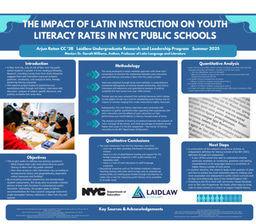Like
Be the first to like this
- How have the workshops and discussions on leadership this week changed your understanding of what leadership means?
The workshops and discussions that we have engaged in as a cohort this week have broadened my understanding of what leadership means and how we perceive and value leadership. I think for many people and definitely myself, I tend to consider the "leader in-front" archetype to be the most valuable because that is who receives attention in textbooks and in many history classes. However, I now understand that there is value and even further, a necessity, for other types of leadership such as leading from behind and leading side-by-side (an archetype I believe I resonate heavily with). - How might you imagine applying one of the four ways of leading during your summer on campus?
This summer I hope to conduct oral history interviews as a part of the qualitative aspect of my research. One of the defining characteristics of oral history interviews is that they are largely driven by the story-telling of the interviewee. In this way, I envision myself employing the leader side-by-side archetype as the interviewer. I will co-lead through my development of guiding questions and an overall framework and also give the interviewee the space to co-lead through story-telling. - What is everyone most excited about engaging in as part of their summer research project?
I am most excited to engage with the genre of oral history because it is a format that I don't have any experience with, but seems like an extremely insightful way to understand others and provide them with the space to share their story on their terms. I believe that it will be a valuable addition to the quantitative measures which I plan to employ in my research in crafting a narrative response to my central research question.


Please sign in
If you are a registered user on Laidlaw Scholars Network, please sign in
I really appreciate your description of oral history as a 'leading-beside’ experience because it emphasizes the reciprocal relationship you are building with the community, while recognizing the interviewee is also a leader. I love your oral history idea because oral history helps preserve knowledge that’s undergone erasure in traditional western written history. Your work is especially interesting within the context of literacy because, with declining literacy rates in NYC that you highlighted in your outline, oral history is an amazing way to share stories of students that may have been overlooked or misinterpreted in the past. How will you create questions for this, and what are you most curious about? I’m really excited to learn more about your project!
Oral history sounds so fascinating!! Excited to see the results!!